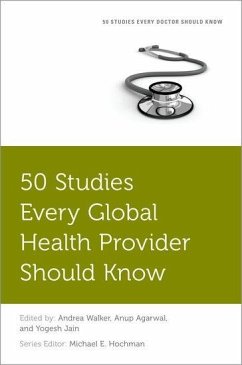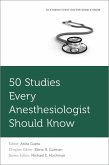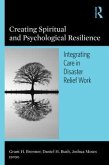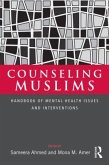Michel E Hochman
50 Studies Every Global Health Provider Should Know
Herausgeber: Walker, Andrea; Jain, Yogesh; Agarwal, Anup
Michel E Hochman
50 Studies Every Global Health Provider Should Know
Herausgeber: Walker, Andrea; Jain, Yogesh; Agarwal, Anup
- Broschiertes Buch
- Merkliste
- Auf die Merkliste
- Bewerten Bewerten
- Teilen
- Produkt teilen
- Produkterinnerung
- Produkterinnerung
Global health is a broad field that is fundamentally about healthcare equity and health as a human right, whether in high- or low-income countries, rural areas, or inner cities. Although understanding disease processes and treatments is important to providing health care, of equal importance is an understanding that the conditions in which people live and work affect a wide range of health outcomes. 50 Studies Every Global Health Provider Should Know presents a diverse series of studies that illustrate key issues to consider in achieving health care as a human right, including health systems…mehr
Andere Kunden interessierten sich auch für
![50 Imaging Studies Every Doctor Should Know 50 Imaging Studies Every Doctor Should Know]() 50 Imaging Studies Every Doctor Should Know80,99 €
50 Imaging Studies Every Doctor Should Know80,99 €![50 Studies Every Anesthesiologist Should Know 50 Studies Every Anesthesiologist Should Know]() Anita Gupta50 Studies Every Anesthesiologist Should Know88,99 €
Anita Gupta50 Studies Every Anesthesiologist Should Know88,99 €![Creating Spiritual and Psychological Resilience Creating Spiritual and Psychological Resilience]() Creating Spiritual and Psychological Resilience57,99 €
Creating Spiritual and Psychological Resilience57,99 €![Sickening Sickening]() John AbramsonSickening34,99 €
John AbramsonSickening34,99 €![Counseling Muslims Counseling Muslims]() Counseling Muslims144,99 €
Counseling Muslims144,99 €![Sickening Sickening]() John AbramsonSickening28,99 €
John AbramsonSickening28,99 €![Live Like Nobody Is Watching Live Like Nobody Is Watching]() Anita Ho (Clinical Associate Professor at the Centre for Applied EtLive Like Nobody Is Watching41,99 €
Anita Ho (Clinical Associate Professor at the Centre for Applied EtLive Like Nobody Is Watching41,99 €-
-
-
Global health is a broad field that is fundamentally about healthcare equity and health as a human right, whether in high- or low-income countries, rural areas, or inner cities. Although understanding disease processes and treatments is important to providing health care, of equal importance is an understanding that the conditions in which people live and work affect a wide range of health outcomes. 50 Studies Every Global Health Provider Should Know presents a diverse series of studies that illustrate key issues to consider in achieving health care as a human right, including health systems and delivery, health policy, the role of implicit bias in healthcare, and how socioeconomic status affects health.
Produktdetails
- Produktdetails
- Fifty Studies Every Doctor Should Know
- Verlag: Oxford University Press Inc
- Seitenzahl: 336
- Erscheinungstermin: 21. August 2023
- Englisch
- Abmessung: 235mm x 156mm x 17mm
- Gewicht: 558g
- ISBN-13: 9780197548721
- ISBN-10: 0197548725
- Artikelnr.: 67864686
- Herstellerkennzeichnung
- Libri GmbH
- Europaallee 1
- 36244 Bad Hersfeld
- gpsr@libri.de
- Fifty Studies Every Doctor Should Know
- Verlag: Oxford University Press Inc
- Seitenzahl: 336
- Erscheinungstermin: 21. August 2023
- Englisch
- Abmessung: 235mm x 156mm x 17mm
- Gewicht: 558g
- ISBN-13: 9780197548721
- ISBN-10: 0197548725
- Artikelnr.: 67864686
- Herstellerkennzeichnung
- Libri GmbH
- Europaallee 1
- 36244 Bad Hersfeld
- gpsr@libri.de
Dr. Andrea Walker, MD, graduated from the David Geffen School of Medicine at UCLA and completed her residency in Obstetrics and Gynecology at UCLA. She went on to complete a Global Health Fellowship through UCSF, where she spent two years working for Indian Health Services on the Navajo Nation in the US and rural Malawi for two years. This experience showed her that many of the problems faced in such disparate communities and countries are at their core quite similar. After this experience, she has continued to work in rural America with a largely Native American population. Her focus is on promoting social justice, identifying and removing barriers to care, improving quality of care, and provision of culturally competent care. Dr. Anup Agarwal, MBBS, is a hospitalist at MedStar Health. He received his medical degree from Stanley Medical College in Chennai, India. After medical school, he spent a year working as a telemedicine consultant in Bangalore, India, where he had the privilege of providing teleconsultations via video conferencing in 22 primary health centers located in rural India. He then worked as a research assistant at Yale University with telemedicine, simulation, and technology in medicine. During his residency at Westchester County Medical Center, he volunteered at Bernard Mevs Hospital in Haiti. He went on to complete a Global Health Fellowship through UCSF. His clinical interests include chronic non-communicable disease especially diabetes and cancer, improving healthcare delivery in resource-poor settings, decision support systems in medicine and telemedicine. Yogesh Jain has an MD in Paediatrics from New Delhi but is a public health physician in practice. He has been primarily involved in 'primary health care' through founding and running community health programmes in rural Chhattisgarh in central India since 1999. He has been involved in understanding the political economy of illnesses and addressing technical and political issues that determine the health care for the rural poor through clinical care, observational research studies, training, and direct political work based on lived experience. He is a strident believer in the state as the primary provider of social services.
* Introduction
* Health Systems and Healthcare Delivery
* 1. The Rwandan Experience: The Impact of Health Systems Strengthening
Interventions in the Context of Prioritizing Health Equity
* 2. Can Informal Providers Be Trained to Provide Good Quality Care?
* 3. Can Under- 5 Mortality Be Reduced by Proactive Community Case
Management? The Effect of Proactive Community Case Management by
Community Health Workers in a Peri- Urban Area in Mali
* 4. A Participatory Intervention with Women's Groups for Reducing
Neonatal Mortality and Maternal Depression: The Ekjut Trial
* 5. A Case Management Strategy for Treating Childhood Pneumonia in a
Community Setting?
* 6. Can Checklists Improve Perinatal Outcomes? The Better Birth Trial
* 7. The SimCard Trial
* 8. DOTS- Plus: Advent of Outpatient Care for MDR- TB
* 9. Does Home- Based Neonatal Care of Sepsis Improve Neonatal
Mortality?
* Social Medicine and Ethics
* 10. Early Life Deprivation and Developmental Origins of Adult
Metabolic Disease: Thrifty Phenotype Hypothesis/ Barker Hypothesis
* 11. Gender Disparity and Heart Diseases in South Africa
* 12. Economic Growth and Child Undernourishment
* 13. Can Social Interventions Prevent Tuberculosis? The Papworth
Experiment (1918- 1943) Revisited
* 14. Socioeconomic Status and Heart Disease: Whitehall Revisited
* 15. Implicit Bias in Pain Management: Manifestations in Patient Care
* 16. Race- Based Medicine- Is It Biological or Profit Driven? The
African- American Heart Failure Trial (A- HeFT)
* 17. How Do Locals Feel about Expats in Global Health?
* 18. Azithromycin to Reduce Childhood Mortality in Sub- Saharan
Africa: The MORDOR Trial
* Infectious Diseases and Neglected Tropical Diseases
* 19. Prevention of HIV: The Partners PrEP Trial
* 20. Reduced Risk of Post- Natal Transmission of HIV with Extended
Antiretroviral Prophylactic Regimen: PEPI Trial (Post- Exposure
Prophylaxis of Infants)
* 21. When to Start HIV Treatment? A Global Question
* 22. Safety and Efficacy of Sulfamethoxazole/ Trimethoprim
Chemoprophylaxis for Pneumocystis carinii Pneumonia in AIDS
* 23. Isoniazid for Preventing TB in HIV- Positive People
* 24. Impact of Improved Treatment of Sexually Transmitted Diseases on
HIV Infection in Rural Tanzania: Randomized Controlled Trial
* 25. A National Program to Introduce Impregnated Bednets to Address
Malaria in Gambia
* 26. Artesunate versus Quinine for Severe Falciparum Malaria: The
South East Asian Quinine Artesunate Malaria Trial (SEAQUAMAT)
* 27. BPaL, A New Oral Regimen for Drug- Resistant Tuberculosis: The
Nix- TB Study
* 28. Can Household Contact Investigation Reduce Tuberculosis?
* 29. Solidarity Trial: The Dawn of a New Era
* 30. Corticosteroids for Bacterial Meningitis in Adults in Sub-
Saharan Africa
* 31. Oral Maintenance Therapy for Cholera in Adults
* Child Health
* 32. Efficacy of Zinc to Control Diarrhea in Developing Nations
* 33. Fluids in Pediatric Sepsis: Are the Recommendations in the Global
North and Global South the Same? The FEAST Trial
* 34. Does Helping Babies Breathe Training Help Reduce Neonatal
Mortality?
* 35. Bubble CPAP as a Cost- Effective Technology to Reduce Need for
Mechanical Ventilation in Neonates
* 36. Sickle Cell Anemia in Children in Sub- Saharan Africa- What Is
the Best Medicine? The REACH Trial
* Women's Health
* 37. Does Prenatal Aspirin Prevent Preterm Preeclampsia? Aspirin
versus Placebo in Pregnancies at High Risk for Preterm Preeclampsia
* 38. Can Tranexamic Acid Stop Postpartum Hemorrhage? The WOMAN Trial
* 39. Magnesium Sulphate for Seizure Prophylaxis in Women with
Preeclampsia: The Magpie Trial
* 40. Effects of Partograms on Birthing Outcomes in Developing Nations
* 41. What Is a Cost- Effective Way to Screen for Cervical Cancer in
Resource- Denied Settings?
* Mental Health
* 42. Can Community Health Workers Effectively Provide Cognitive
Behavioral Therapy- Based Services?
* 43. Improving Mental Health Access Where There Is No Psychiatrist:
Collaborative Care Model for Depression in Rural Nepal
* 44. Nonphysician- Led Multidisciplinary Stepped- Care Program vs.
Usual Primary Care Program for Females with Major Depression
* Noncommunicable Diseases
* 45. Aspirin in Acute Stroke: When Thrombolysis Is Not Available
* 46. Unavailability of Cardiac Catheterization: Thrombolysis Is Safe
and Effective in Myocardial Infarction
* 47. SPRINT Trial: Hypertension Management in Resource- Denied
Settings
* Surgery
* 48. Where There Is No Anesthetist, Is Ketamine a Good Alternative?
* 49. Do Checklists Improve Surgical Outcomes in Under- Resourced
Settings?
* 50. Task- Shifting for Caesarean Section: Can Clinical Officers
Provide Equivalent Quality of Care Where There Are No Doctors?
* Index
* Health Systems and Healthcare Delivery
* 1. The Rwandan Experience: The Impact of Health Systems Strengthening
Interventions in the Context of Prioritizing Health Equity
* 2. Can Informal Providers Be Trained to Provide Good Quality Care?
* 3. Can Under- 5 Mortality Be Reduced by Proactive Community Case
Management? The Effect of Proactive Community Case Management by
Community Health Workers in a Peri- Urban Area in Mali
* 4. A Participatory Intervention with Women's Groups for Reducing
Neonatal Mortality and Maternal Depression: The Ekjut Trial
* 5. A Case Management Strategy for Treating Childhood Pneumonia in a
Community Setting?
* 6. Can Checklists Improve Perinatal Outcomes? The Better Birth Trial
* 7. The SimCard Trial
* 8. DOTS- Plus: Advent of Outpatient Care for MDR- TB
* 9. Does Home- Based Neonatal Care of Sepsis Improve Neonatal
Mortality?
* Social Medicine and Ethics
* 10. Early Life Deprivation and Developmental Origins of Adult
Metabolic Disease: Thrifty Phenotype Hypothesis/ Barker Hypothesis
* 11. Gender Disparity and Heart Diseases in South Africa
* 12. Economic Growth and Child Undernourishment
* 13. Can Social Interventions Prevent Tuberculosis? The Papworth
Experiment (1918- 1943) Revisited
* 14. Socioeconomic Status and Heart Disease: Whitehall Revisited
* 15. Implicit Bias in Pain Management: Manifestations in Patient Care
* 16. Race- Based Medicine- Is It Biological or Profit Driven? The
African- American Heart Failure Trial (A- HeFT)
* 17. How Do Locals Feel about Expats in Global Health?
* 18. Azithromycin to Reduce Childhood Mortality in Sub- Saharan
Africa: The MORDOR Trial
* Infectious Diseases and Neglected Tropical Diseases
* 19. Prevention of HIV: The Partners PrEP Trial
* 20. Reduced Risk of Post- Natal Transmission of HIV with Extended
Antiretroviral Prophylactic Regimen: PEPI Trial (Post- Exposure
Prophylaxis of Infants)
* 21. When to Start HIV Treatment? A Global Question
* 22. Safety and Efficacy of Sulfamethoxazole/ Trimethoprim
Chemoprophylaxis for Pneumocystis carinii Pneumonia in AIDS
* 23. Isoniazid for Preventing TB in HIV- Positive People
* 24. Impact of Improved Treatment of Sexually Transmitted Diseases on
HIV Infection in Rural Tanzania: Randomized Controlled Trial
* 25. A National Program to Introduce Impregnated Bednets to Address
Malaria in Gambia
* 26. Artesunate versus Quinine for Severe Falciparum Malaria: The
South East Asian Quinine Artesunate Malaria Trial (SEAQUAMAT)
* 27. BPaL, A New Oral Regimen for Drug- Resistant Tuberculosis: The
Nix- TB Study
* 28. Can Household Contact Investigation Reduce Tuberculosis?
* 29. Solidarity Trial: The Dawn of a New Era
* 30. Corticosteroids for Bacterial Meningitis in Adults in Sub-
Saharan Africa
* 31. Oral Maintenance Therapy for Cholera in Adults
* Child Health
* 32. Efficacy of Zinc to Control Diarrhea in Developing Nations
* 33. Fluids in Pediatric Sepsis: Are the Recommendations in the Global
North and Global South the Same? The FEAST Trial
* 34. Does Helping Babies Breathe Training Help Reduce Neonatal
Mortality?
* 35. Bubble CPAP as a Cost- Effective Technology to Reduce Need for
Mechanical Ventilation in Neonates
* 36. Sickle Cell Anemia in Children in Sub- Saharan Africa- What Is
the Best Medicine? The REACH Trial
* Women's Health
* 37. Does Prenatal Aspirin Prevent Preterm Preeclampsia? Aspirin
versus Placebo in Pregnancies at High Risk for Preterm Preeclampsia
* 38. Can Tranexamic Acid Stop Postpartum Hemorrhage? The WOMAN Trial
* 39. Magnesium Sulphate for Seizure Prophylaxis in Women with
Preeclampsia: The Magpie Trial
* 40. Effects of Partograms on Birthing Outcomes in Developing Nations
* 41. What Is a Cost- Effective Way to Screen for Cervical Cancer in
Resource- Denied Settings?
* Mental Health
* 42. Can Community Health Workers Effectively Provide Cognitive
Behavioral Therapy- Based Services?
* 43. Improving Mental Health Access Where There Is No Psychiatrist:
Collaborative Care Model for Depression in Rural Nepal
* 44. Nonphysician- Led Multidisciplinary Stepped- Care Program vs.
Usual Primary Care Program for Females with Major Depression
* Noncommunicable Diseases
* 45. Aspirin in Acute Stroke: When Thrombolysis Is Not Available
* 46. Unavailability of Cardiac Catheterization: Thrombolysis Is Safe
and Effective in Myocardial Infarction
* 47. SPRINT Trial: Hypertension Management in Resource- Denied
Settings
* Surgery
* 48. Where There Is No Anesthetist, Is Ketamine a Good Alternative?
* 49. Do Checklists Improve Surgical Outcomes in Under- Resourced
Settings?
* 50. Task- Shifting for Caesarean Section: Can Clinical Officers
Provide Equivalent Quality of Care Where There Are No Doctors?
* Index
* Introduction
* Health Systems and Healthcare Delivery
* 1. The Rwandan Experience: The Impact of Health Systems Strengthening
Interventions in the Context of Prioritizing Health Equity
* 2. Can Informal Providers Be Trained to Provide Good Quality Care?
* 3. Can Under- 5 Mortality Be Reduced by Proactive Community Case
Management? The Effect of Proactive Community Case Management by
Community Health Workers in a Peri- Urban Area in Mali
* 4. A Participatory Intervention with Women's Groups for Reducing
Neonatal Mortality and Maternal Depression: The Ekjut Trial
* 5. A Case Management Strategy for Treating Childhood Pneumonia in a
Community Setting?
* 6. Can Checklists Improve Perinatal Outcomes? The Better Birth Trial
* 7. The SimCard Trial
* 8. DOTS- Plus: Advent of Outpatient Care for MDR- TB
* 9. Does Home- Based Neonatal Care of Sepsis Improve Neonatal
Mortality?
* Social Medicine and Ethics
* 10. Early Life Deprivation and Developmental Origins of Adult
Metabolic Disease: Thrifty Phenotype Hypothesis/ Barker Hypothesis
* 11. Gender Disparity and Heart Diseases in South Africa
* 12. Economic Growth and Child Undernourishment
* 13. Can Social Interventions Prevent Tuberculosis? The Papworth
Experiment (1918- 1943) Revisited
* 14. Socioeconomic Status and Heart Disease: Whitehall Revisited
* 15. Implicit Bias in Pain Management: Manifestations in Patient Care
* 16. Race- Based Medicine- Is It Biological or Profit Driven? The
African- American Heart Failure Trial (A- HeFT)
* 17. How Do Locals Feel about Expats in Global Health?
* 18. Azithromycin to Reduce Childhood Mortality in Sub- Saharan
Africa: The MORDOR Trial
* Infectious Diseases and Neglected Tropical Diseases
* 19. Prevention of HIV: The Partners PrEP Trial
* 20. Reduced Risk of Post- Natal Transmission of HIV with Extended
Antiretroviral Prophylactic Regimen: PEPI Trial (Post- Exposure
Prophylaxis of Infants)
* 21. When to Start HIV Treatment? A Global Question
* 22. Safety and Efficacy of Sulfamethoxazole/ Trimethoprim
Chemoprophylaxis for Pneumocystis carinii Pneumonia in AIDS
* 23. Isoniazid for Preventing TB in HIV- Positive People
* 24. Impact of Improved Treatment of Sexually Transmitted Diseases on
HIV Infection in Rural Tanzania: Randomized Controlled Trial
* 25. A National Program to Introduce Impregnated Bednets to Address
Malaria in Gambia
* 26. Artesunate versus Quinine for Severe Falciparum Malaria: The
South East Asian Quinine Artesunate Malaria Trial (SEAQUAMAT)
* 27. BPaL, A New Oral Regimen for Drug- Resistant Tuberculosis: The
Nix- TB Study
* 28. Can Household Contact Investigation Reduce Tuberculosis?
* 29. Solidarity Trial: The Dawn of a New Era
* 30. Corticosteroids for Bacterial Meningitis in Adults in Sub-
Saharan Africa
* 31. Oral Maintenance Therapy for Cholera in Adults
* Child Health
* 32. Efficacy of Zinc to Control Diarrhea in Developing Nations
* 33. Fluids in Pediatric Sepsis: Are the Recommendations in the Global
North and Global South the Same? The FEAST Trial
* 34. Does Helping Babies Breathe Training Help Reduce Neonatal
Mortality?
* 35. Bubble CPAP as a Cost- Effective Technology to Reduce Need for
Mechanical Ventilation in Neonates
* 36. Sickle Cell Anemia in Children in Sub- Saharan Africa- What Is
the Best Medicine? The REACH Trial
* Women's Health
* 37. Does Prenatal Aspirin Prevent Preterm Preeclampsia? Aspirin
versus Placebo in Pregnancies at High Risk for Preterm Preeclampsia
* 38. Can Tranexamic Acid Stop Postpartum Hemorrhage? The WOMAN Trial
* 39. Magnesium Sulphate for Seizure Prophylaxis in Women with
Preeclampsia: The Magpie Trial
* 40. Effects of Partograms on Birthing Outcomes in Developing Nations
* 41. What Is a Cost- Effective Way to Screen for Cervical Cancer in
Resource- Denied Settings?
* Mental Health
* 42. Can Community Health Workers Effectively Provide Cognitive
Behavioral Therapy- Based Services?
* 43. Improving Mental Health Access Where There Is No Psychiatrist:
Collaborative Care Model for Depression in Rural Nepal
* 44. Nonphysician- Led Multidisciplinary Stepped- Care Program vs.
Usual Primary Care Program for Females with Major Depression
* Noncommunicable Diseases
* 45. Aspirin in Acute Stroke: When Thrombolysis Is Not Available
* 46. Unavailability of Cardiac Catheterization: Thrombolysis Is Safe
and Effective in Myocardial Infarction
* 47. SPRINT Trial: Hypertension Management in Resource- Denied
Settings
* Surgery
* 48. Where There Is No Anesthetist, Is Ketamine a Good Alternative?
* 49. Do Checklists Improve Surgical Outcomes in Under- Resourced
Settings?
* 50. Task- Shifting for Caesarean Section: Can Clinical Officers
Provide Equivalent Quality of Care Where There Are No Doctors?
* Index
* Health Systems and Healthcare Delivery
* 1. The Rwandan Experience: The Impact of Health Systems Strengthening
Interventions in the Context of Prioritizing Health Equity
* 2. Can Informal Providers Be Trained to Provide Good Quality Care?
* 3. Can Under- 5 Mortality Be Reduced by Proactive Community Case
Management? The Effect of Proactive Community Case Management by
Community Health Workers in a Peri- Urban Area in Mali
* 4. A Participatory Intervention with Women's Groups for Reducing
Neonatal Mortality and Maternal Depression: The Ekjut Trial
* 5. A Case Management Strategy for Treating Childhood Pneumonia in a
Community Setting?
* 6. Can Checklists Improve Perinatal Outcomes? The Better Birth Trial
* 7. The SimCard Trial
* 8. DOTS- Plus: Advent of Outpatient Care for MDR- TB
* 9. Does Home- Based Neonatal Care of Sepsis Improve Neonatal
Mortality?
* Social Medicine and Ethics
* 10. Early Life Deprivation and Developmental Origins of Adult
Metabolic Disease: Thrifty Phenotype Hypothesis/ Barker Hypothesis
* 11. Gender Disparity and Heart Diseases in South Africa
* 12. Economic Growth and Child Undernourishment
* 13. Can Social Interventions Prevent Tuberculosis? The Papworth
Experiment (1918- 1943) Revisited
* 14. Socioeconomic Status and Heart Disease: Whitehall Revisited
* 15. Implicit Bias in Pain Management: Manifestations in Patient Care
* 16. Race- Based Medicine- Is It Biological or Profit Driven? The
African- American Heart Failure Trial (A- HeFT)
* 17. How Do Locals Feel about Expats in Global Health?
* 18. Azithromycin to Reduce Childhood Mortality in Sub- Saharan
Africa: The MORDOR Trial
* Infectious Diseases and Neglected Tropical Diseases
* 19. Prevention of HIV: The Partners PrEP Trial
* 20. Reduced Risk of Post- Natal Transmission of HIV with Extended
Antiretroviral Prophylactic Regimen: PEPI Trial (Post- Exposure
Prophylaxis of Infants)
* 21. When to Start HIV Treatment? A Global Question
* 22. Safety and Efficacy of Sulfamethoxazole/ Trimethoprim
Chemoprophylaxis for Pneumocystis carinii Pneumonia in AIDS
* 23. Isoniazid for Preventing TB in HIV- Positive People
* 24. Impact of Improved Treatment of Sexually Transmitted Diseases on
HIV Infection in Rural Tanzania: Randomized Controlled Trial
* 25. A National Program to Introduce Impregnated Bednets to Address
Malaria in Gambia
* 26. Artesunate versus Quinine for Severe Falciparum Malaria: The
South East Asian Quinine Artesunate Malaria Trial (SEAQUAMAT)
* 27. BPaL, A New Oral Regimen for Drug- Resistant Tuberculosis: The
Nix- TB Study
* 28. Can Household Contact Investigation Reduce Tuberculosis?
* 29. Solidarity Trial: The Dawn of a New Era
* 30. Corticosteroids for Bacterial Meningitis in Adults in Sub-
Saharan Africa
* 31. Oral Maintenance Therapy for Cholera in Adults
* Child Health
* 32. Efficacy of Zinc to Control Diarrhea in Developing Nations
* 33. Fluids in Pediatric Sepsis: Are the Recommendations in the Global
North and Global South the Same? The FEAST Trial
* 34. Does Helping Babies Breathe Training Help Reduce Neonatal
Mortality?
* 35. Bubble CPAP as a Cost- Effective Technology to Reduce Need for
Mechanical Ventilation in Neonates
* 36. Sickle Cell Anemia in Children in Sub- Saharan Africa- What Is
the Best Medicine? The REACH Trial
* Women's Health
* 37. Does Prenatal Aspirin Prevent Preterm Preeclampsia? Aspirin
versus Placebo in Pregnancies at High Risk for Preterm Preeclampsia
* 38. Can Tranexamic Acid Stop Postpartum Hemorrhage? The WOMAN Trial
* 39. Magnesium Sulphate for Seizure Prophylaxis in Women with
Preeclampsia: The Magpie Trial
* 40. Effects of Partograms on Birthing Outcomes in Developing Nations
* 41. What Is a Cost- Effective Way to Screen for Cervical Cancer in
Resource- Denied Settings?
* Mental Health
* 42. Can Community Health Workers Effectively Provide Cognitive
Behavioral Therapy- Based Services?
* 43. Improving Mental Health Access Where There Is No Psychiatrist:
Collaborative Care Model for Depression in Rural Nepal
* 44. Nonphysician- Led Multidisciplinary Stepped- Care Program vs.
Usual Primary Care Program for Females with Major Depression
* Noncommunicable Diseases
* 45. Aspirin in Acute Stroke: When Thrombolysis Is Not Available
* 46. Unavailability of Cardiac Catheterization: Thrombolysis Is Safe
and Effective in Myocardial Infarction
* 47. SPRINT Trial: Hypertension Management in Resource- Denied
Settings
* Surgery
* 48. Where There Is No Anesthetist, Is Ketamine a Good Alternative?
* 49. Do Checklists Improve Surgical Outcomes in Under- Resourced
Settings?
* 50. Task- Shifting for Caesarean Section: Can Clinical Officers
Provide Equivalent Quality of Care Where There Are No Doctors?
* Index








